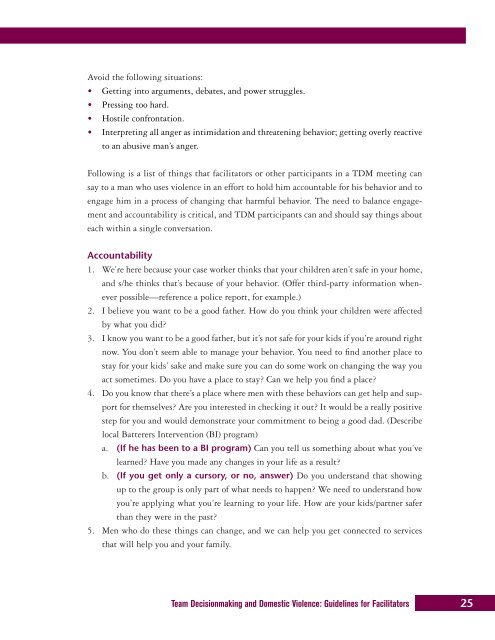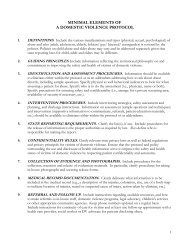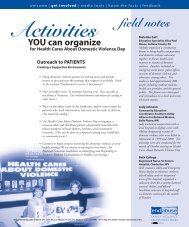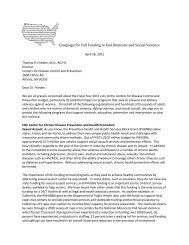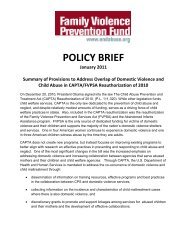Team Decisionmaking and Domestic Violence: Guidelines for ...
Team Decisionmaking and Domestic Violence: Guidelines for ...
Team Decisionmaking and Domestic Violence: Guidelines for ...
You also want an ePaper? Increase the reach of your titles
YUMPU automatically turns print PDFs into web optimized ePapers that Google loves.
Avoid the following situations:<br />
• Getting into arguments, debates, <strong>and</strong> power struggles.<br />
• Pressing too hard.<br />
• Hostile confrontation.<br />
• Interpreting all anger as intimidation <strong>and</strong> threatening behavior; getting overly reactive<br />
to an abusive man’s anger.<br />
Following is a list of things that facilitators or other participants in a TDM meeting can<br />
say to a man who uses violence in an ef<strong>for</strong>t to hold him accountable <strong>for</strong> his behavior <strong>and</strong> to<br />
engage him in a process of changing that harmful behavior. The need to balance engagement<br />
<strong>and</strong> accountability is critical, <strong>and</strong> TDM participants can <strong>and</strong> should say things about<br />
each within a single conversation.<br />
Accountability<br />
1. We’re here because your case worker thinks that your children aren’t safe in your home,<br />
<strong>and</strong> s/he thinks that’s because of your behavior. (Offer third-party in<strong>for</strong>mation whenever<br />
possible—reference a police report, <strong>for</strong> example.)<br />
2. I believe you want to be a good father. How do you think your children were affected<br />
by what you did?<br />
3. I know you want to be a good father, but it’s not safe <strong>for</strong> your kids if you’re around right<br />
now. You don’t seem able to manage your behavior. You need to find another place to<br />
stay <strong>for</strong> your kids’ sake <strong>and</strong> make sure you can do some work on changing the way you<br />
act sometimes. Do you have a place to stay? Can we help you find a place?<br />
4. Do you know that there’s a place where men with these behaviors can get help <strong>and</strong> support<br />
<strong>for</strong> themselves? Are you interested in checking it out? It would be a really positive<br />
step <strong>for</strong> you <strong>and</strong> would demonstrate your commitment to being a good dad. (Describe<br />
local Batterers Intervention (BI) program)<br />
a. (If he has been to a BI program) Can you tell us something about what you’ve<br />
learned? Have you made any changes in your life as a result?<br />
b. (If you get only a cursory, or no, answer) Do you underst<strong>and</strong> that showing<br />
up to the group is only part of what needs to happen? We need to underst<strong>and</strong> how<br />
you’re applying what you’re learning to your life. How are your kids/partner safer<br />
than they were in the past?<br />
5. Men who do these things can change, <strong>and</strong> we can help you get connected to services<br />
that will help you <strong>and</strong> your family.<br />
<strong>Team</strong> <strong>Decisionmaking</strong> <strong>and</strong> <strong>Domestic</strong> <strong>Violence</strong>: <strong>Guidelines</strong> <strong>for</strong> Facilitators 25


